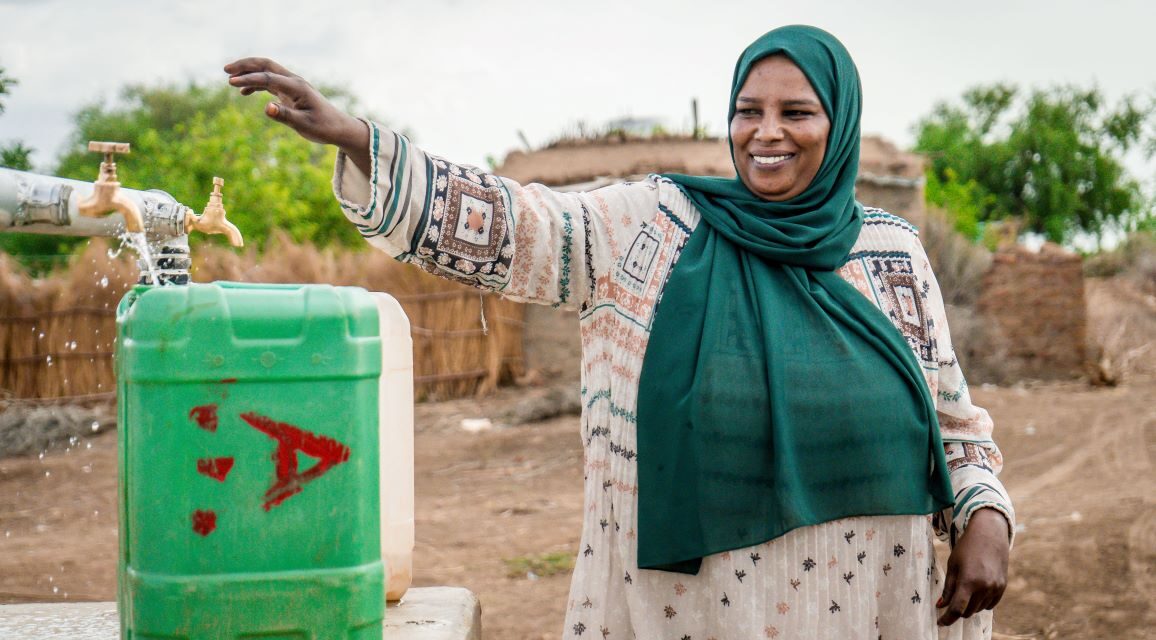Water flows again as Sudanese communities rebuild hope
In Kassala and Gedarif states in Sudan – where families walked miles for stagnant canal water and children regularly fell ill – clean water is available once more.
A project to improve the health and nutrition of communities in East Sudan, which had been paused earlier this year due to international funding cuts, has been successfully completed.
Thanks to renewed backing, including vital funding from the players of People’s Postcode Lottery, unfinished water stations are being completed, solar irrigation systems installed, and communities are once again at the centre of shaping their future.
The programme, which supported more than 5,000 people previously forced to share drinking water with livestock, was suddenly halted as a result to huge cuts to USAID, announced on the 20th of January 2025.
The project began in October 2024 to address water scarcity and the hunger of rural communities in eastern Sudan.
The cuts left half-built infrastructure and put the health and lives of families at risk. But thanks to the donations of supporters, and funding from the players of People’s Postcode Lottery, Practical Action was able to reorganise its resources and continue to pay staff while a new donor was found. The World Food Programme continued to fund the project with the help of USAID.
Meanwhile, the Sudanese communities also did not give up; they safeguarded building materials, covered exposed wells, and were ready to resume the work.
“The suspension shook people’s trust and created big operational hurdles,” said Elmutaz Eltayeb, Head of Programme Delivery for Practical Action in Sudan. “But now, with renewed support, we can complete the water yards, restore solar irrigation and continue vital training sessions. Despite the delay, the vision of safer water and stronger livelihoods is alive.”
Over the past few months, the project has already shown how locally led action can deliver lasting change. Women have taken leading roles in planning and training; communities have been involved in every stage of construction; and abandoned sites are being reclaimed for productive use.
The numbers so far
- 16 solar-powered water yards under rehabilitation
- 10 solar-powered water yards has finished construction
- 20, 720 families have access to safe, clean drinking water
- 5 Solar irrigation systems installed to boost agricultural productivity
- Water committees (consisting of 10 people – 3 women and 7 men) were trained in maintaining these water yards and were linked with the Water Drinking Corporation
“This work is about much more than pipes and pumps—it’s dignity, health, and resilience,” said Muna Eltahir, Country Director. “Thanks to the generosity of our supporters, and funding from the players of People’s Postcode Lottery, we were able to keep the project alive during a critical pause. The unrestricted funding meant we could reorganise our resources, retain staff, and keep working alongside communities while new donors were secured. Without this flexibility, vital progress would have stalled and the hope families held onto might have been lost.
“On behalf of all of us, we are grateful to the players of People’s Postcode Lottery for believing in this work and making it possible.”
“Now that water is flowing again, families in Kassala and Gedarif are beginning to experience real change in their daily lives. And this is just the start—by scaling up, we can reach even more communities with safe water, improved food production, and the resilience they need for the future.”
The project has been successfully completed, delivering essential water stations and addressing the risks posed by exposed wells to people and livestock. Communities in Kassala and Gedarif are now benefiting from safe drinking water and improved food security.
Thanks to this support, families are not only surviving today’s challenges but are better equipped to build resilience for the future.
The project is called Building Resilience for Food-Vulnerable Households.
